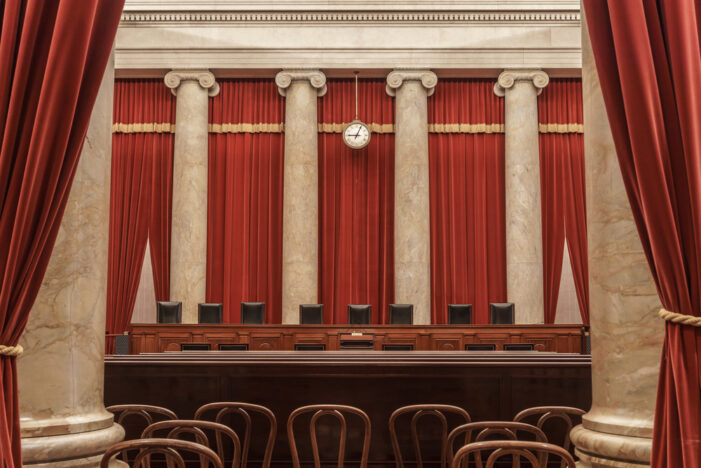Posted by Gianna Borroto// ImmigrationIm0pact.com
Editorial credit: Erik Cox Photography / Shutterstock.com
In a unanimous decision, the Supreme Court ruled last week that a transgender woman from Guatemala did not need to jump through an additional hoop—filing a new motion with the Board of Immigration Appeals (BIA)—before she could take her case to federal court to challenge her deportation order.
The Court ruled that such motions are not required. It also recognized that the government’s position would produce untenable results for an already overburdened immigration court system.
The case, Santos-Zacaria v. Garland, focuses on what steps a noncitizen needs to take to try to resolve their case with a government agency before they can appeal to a federal court. This process is known as “exhaustion of administrative remedies.” Exhaustion typically prevents the noncitizen from raising new legal arguments before the federal appeals court. Instead, they must make all legal arguments with the agency first, in this case, with the BIA—before they can make them in federal court.
In theory, exhaustion helps avoid straining the federal courts with cases that can be resolved by the administrative agencies. But in cases like Santos Zacaria’s, requiring an additional motion before the BIA would only waste administrative resources and unnecessarily burden the noncitizen.
In this case, when the BIA reviewed the immigration court’s decision ordering Santos Zacaria removed, it introduced a new reason for denial, which Santos Zacaria alleges was an error. She challenged that error in federal court before the Fifth Circuit Court of Appeals. The government and the Fifth Circuit would have required her to go back to the BIA and file a new motion there, asking it to admit its error. But for many immigrants, especially those without a lawyer, this extra step would make it impossible to keep fighting their cases. It would also create more work for an already overburdened BIA, where decisions can often take over a year.
The Court considered two questions in Santos-Zacaria v. Garland. Is a court of appeals barred from hearing a case when a noncitizen fails to take all necessary steps to resolve the case before the administrative agency? When the BIA decision introduces a new error, does the noncitizen have to file a motion asking the BIA to reconsider its decision, or can they go straight to the court of appeals?
Writing for the Court, Justice Ketanji Brown Jackson held that appellate courts can make exceptions to the immigration statute’s exhaustion requirement because Congress has not said otherwise. Failing to allow exceptions “could disserve the very interest in efficiency that exhaustion ordinarily advances.”
As to the second question, the Court ruled that noncitizens do not have to file a motion to reconsider with the Board before appealing to a federal court. The Court reasoned that a motion to reconsider is discretionary and therefore cannot be required for exhaustion.
The Court also recognized the impracticability of the government’s argument, noting that requiring a motion to reconsider in cases like Santos Zacaria’s would “present[] a world of administrability headaches for courts, traps for unwary noncitizens, and mountains of reconsideration requests for the Board.”
In a concurrence, Justices Alito and Thomas agreed with the decision but did not find it necessary for the Court to decide the first question.
The petitioner, Estrella Santos Zacaria, applied for withholding of removal in immigration court based on sexual abuse she suffered in her home country as a transgender woman who is attracted to men. The immigration judge found her credible but ruled that the harm she suffered in Guatemala was not severe enough to merit protection.
Ms. Santos Zacaria appealed to the BIA, which made new findings and denied her claim for a different reason. Ms. Santos Zacaria then appealed her case to the Fifth Circuit, arguing that the BIA had improperly denied her protection by engaging in fact-finding that only the immigration judge could do.
Rather than ruling on the merits of her claim, the Fifth Circuit found that Ms. Santos Zacaria could not bring her case to the court of appeals because she had not first filed a motion to reconsider with the BIA. Ms. Santos Zacaria took the case to the Supreme Court, which heard oral argument in January.
Last week’s ruling means that Ms. Santos Zacaria can continue to fight for protection in the United States. For other noncitizens, it means that they will not have to waste precious time and resources filing an unnecessary motion when the BIA makes a new error.
In a system riddled with hurdles and inefficiencies, the Supreme Court’s decision helps eliminate one unnecessary hurdle for people in the immigration court system. But it is up to Congress to take action to alleviate the immigration court backlog and ensure that noncitizens’ due process rights are protected in a system that is already stacked against them.

